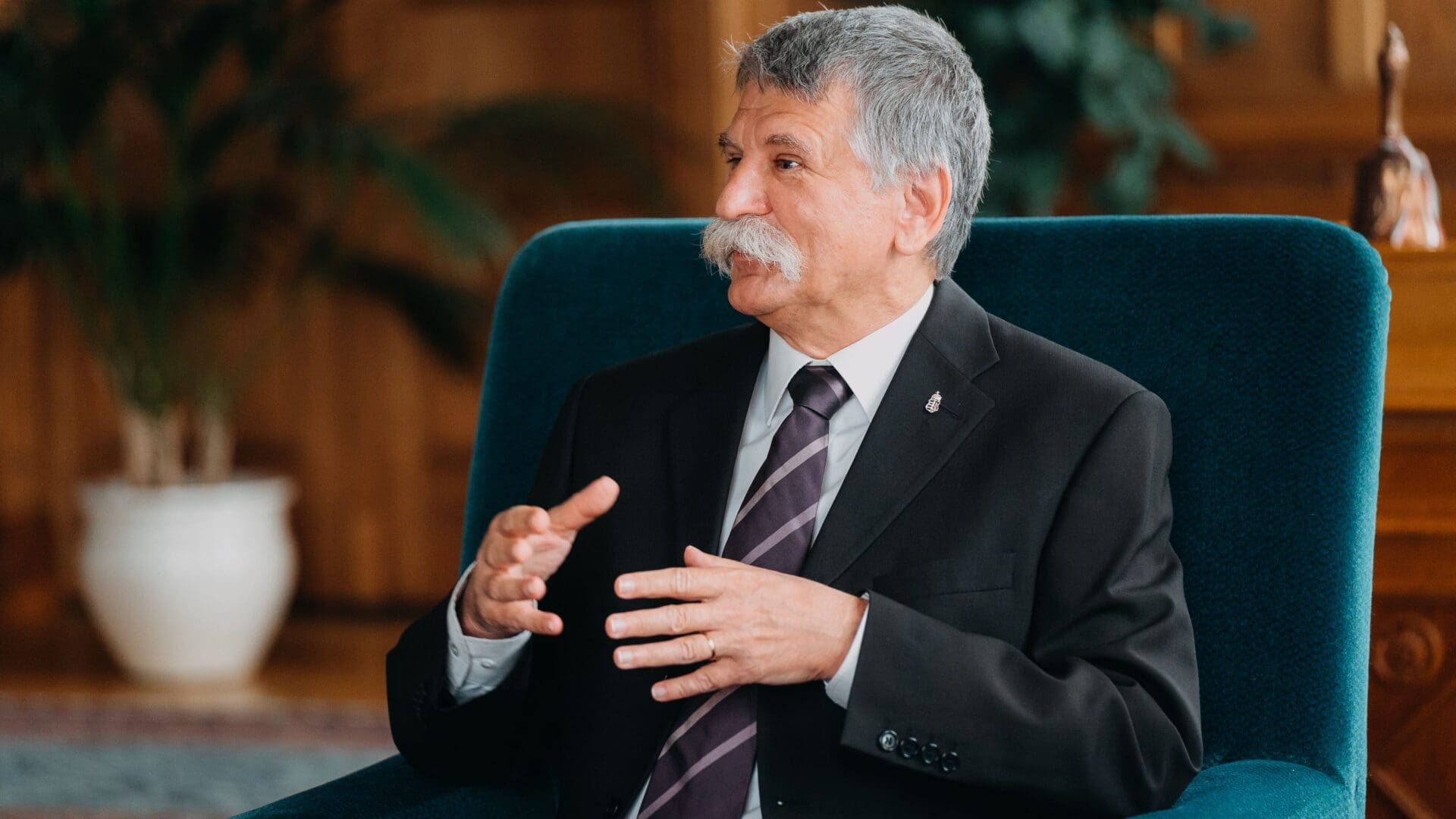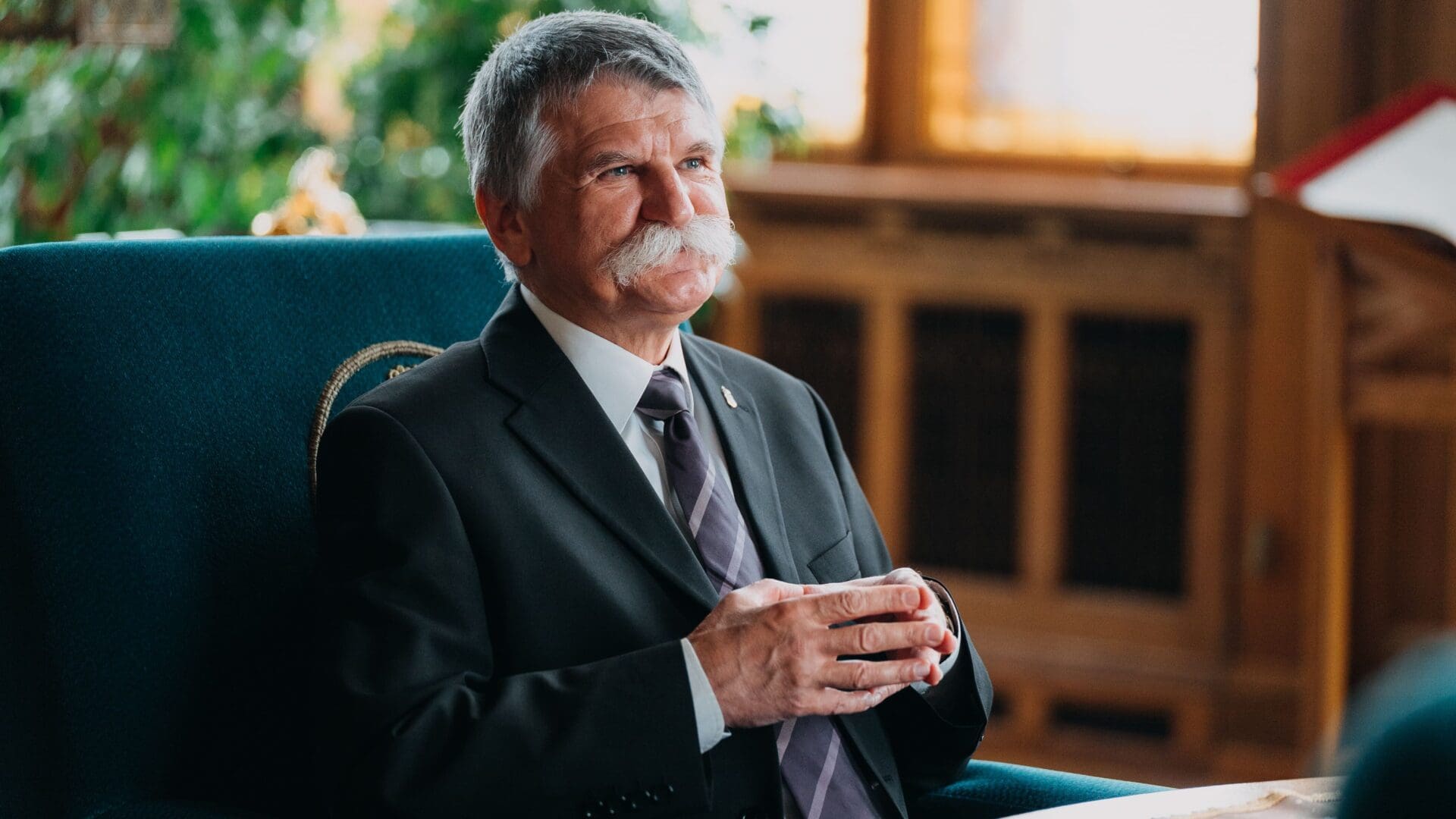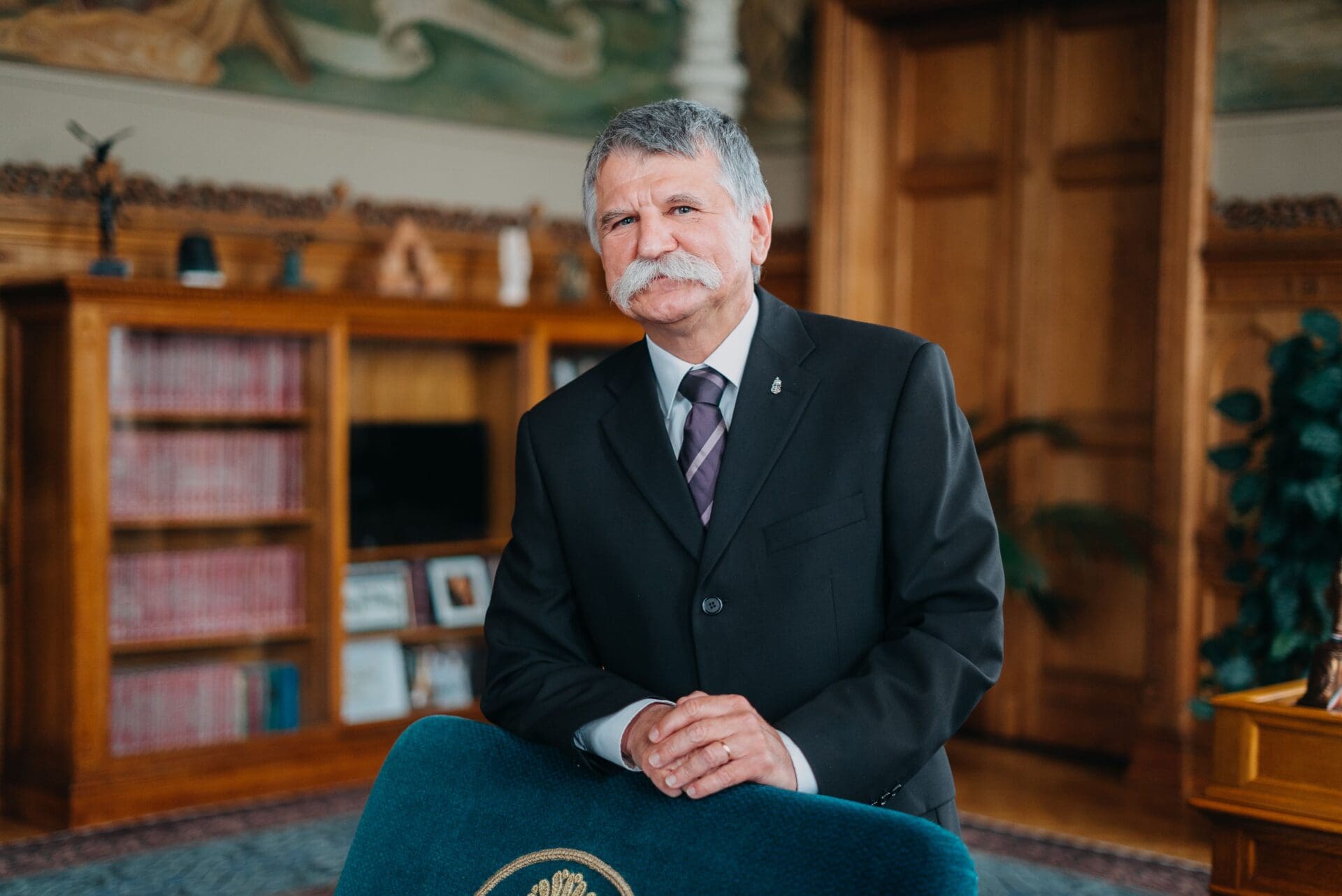‘We have both the right and the power to be the end in ourselves, not a tool of foreign ends’, says a quotation by Lajos Kossuth that you cited earlier this year. As the Speaker of the supreme body of Hungarian sovereignty, how do you see the prospects for the idea of sovereignty in today’s international environment?
Behind the events of every single crisis today there lies the following conflict: will the countries, the nations involved be able to retain their sovereignty or will they lose it? And if they lose it, the question arises: was that due to the expansionist goals of a dominant regional power or the aspirations of unseen forces that emerged as a result of globalization, forces that a few decades ago we could not even name? And let me add: we could not even identify them, and those who attempted to do so, were immediately relegated to the camp of batty conspiracy theorists. But nowadays, these issues surface in the statements of politicians aiming to reshape the European Union. What was once conceived as a community of independent sovereign states is now being pushed toward a vision of a ‘United States of Europe’, relegating Member States to mere imperial territories.
What is your generation’s assessment of the regime change in Hungary, of EU accession, and the subsequent era?
For decades, while under the yoke of the Soviet empire, we hoped that the day would come when we could re-join the community of European free nations. After 1990, we suddenly found ourselves in a position where these aspirations could actually materialize. And we did not lose our illusions even during the one and a half decades we were made to wait at the gates of the European Union. However, by today, we’ve reached a point where the community we were once so eager to join poses as much a threat to our sovereignty—our culture, our very survival—as historical empires did in the past, be it the Soviet Union, Nazi Germany, the Habsburg or the Ottoman empires.

Do you believe there’s essentially nothing new in our history?
For the information of your readers, we’re currently seated in the Nándorfehérvár Hall inside the House of Parliament, where behind you there is a fresco depicting the Triumph of Belgrade (Nándorfehérvár) in 1456, bearing the inscription ‘Hungary is the bastion of Christianity’. This existential situation has been a recurring theme for at least five and a half centuries: our continuous struggle to defend the eastern front line of Western civilization, often caught between ‘two heathens’ in the fight for our homeland. Nevertheless, in the current situation, there’s actually no need to be anxious, as throughout history, every empire that we fought has since ceased to exist—albeit leaving behind lasting and severe damage. The European Union, too, will eventually be gone as an empire, while we will remain here as an independent nation—despite the enormity of the threat posed, which surpasses all previous ones.
Why do you think the threat is unprecedented?
Because this empire is capable of leveraging the technological advances at its disposal to construct a machinery of influence over consciousness, something no previous entity was capable of doing.
In your response to the very first question, the emphasis was on the European Union, yet in the quoted Kossuth statement, ‘foreign ends’ is plural. Are there additional entities with their own ends posing a threat to Hungarian sovereignty, or is the primary challenge currently rooted in the European Union and the ideology advocating for federalism?
From our point of view, the European Union and integration are not ends in themselves, but a means—a means to assert our national interests and defend our sovereignty. But it is also true the other way round: the European Union is a also just a tool in the hands of those who have taken over its institutions. And these institutions systematically exclude the citizens of EU states from the decisions that affect them. The leaders of most states are either complicit in this or are not in a strong enough position to resist. We are one of the few exceptions, and we the only ones to speak openly about this scandal.
Hungary therefore enjoys greater sovereignty at this moment, even in this dramatic situation, than the European Union,
whose ever more extensive and ever more aggressive bureaucracy has itself become the most immediate threat to the survival of European freedom and way of life. It has long since ceased to represent Europe’s interests in the world at large and has become the governor of a global network implementing an Orwellian scenario.
Are you referring to the United States?
I’m not suggesting that the United States of America, as a nation-state, is the driving force behind this endeavour. Rather, I believe that the United States is just as much simply an instrument in this matter as is the institutional framework of the European Union.
So, despite all harmful efforts, you perceive Hungarian sovereignty as more robust compared to, for instance, the independence of the European Union. In June 2022, the Hungarian Parliament passed a resolution mandating the Government to represent for the Hungarian position on the future of the European Union. Could you please elaborate on the core aspects of this resolution and its significance in the ongoing debate?
The resolution in question was a response to the European Commission initiating a so-called ‘debate’ on the future of Europe. It’s crucial to stress that this exchange of ideas was in fact supposed to be not about the future of the European Union but about that of Europe, and it turned out to be nothing resembling a genuine debate. Partly, by the way, because, discounting Hungary and perhaps one or two other Member States, it met with complete indifference. we could put it this way: this initiative directed at the sovereign citizens by the Brussels bureaucracy simply did not pass their threshold of sensation.

Predictably, it seemed more like an attempt to legitimize pre-established objectives. And although the final outcome did not align with the original intentions of the initiators of the ‘debate’, they seemed unperturbed, staunchly holding onto their preconceived conclusion that it was deeper and more robust integration that would fortify Europe in the 21st century, enabling it to confront future challenges—be it dealing with potential epidemics like Covid, safeguarding borders, or addressing any other issue indeed relevant for Europe.
Is this conclusion wrong?
Definitely. On the contrary, it’s the nation-states that have effectively shielded their citizens against these challenges. It would have been helpful if the European Union had offered assistance, but it failed, at best. At worst, regarding issues like illegal migration or the Russo–Ukrainian conflict, it made matters worse. It put its own Member States into harm’s way. Instead of aiding Member States, including Hungary, in their endeavours to safeguard the Union’s external borders, the EU systematically worked against them. The repercussions are dire: social unrest, increased crime, terrorism, and the importing of problems from the so-called Third World into Europe. Moreover, the EU’s major powers not only
demonstrated weakness and lack of credibility in their attempts to prevent the Russo–Ukrainian conflict from escalating into warfare,
but they also severely hampered the EU’s already declining competitiveness by yielding to a sanctions mechanism imposed by Washington. Not to mention the silly climate policy reminiscent of the velleitarianism of the Communis times. Going back to the parliamentary resolution: this document urges the government to convey the sentiments of the Hungarian society and of the National Assembly, its first and foremost representative, to the European Union institutions. This aligns perfectly with Ferenc Deák’s analogy: In order to properly wear a vest that’s incorrectly buttoned, it needs to be unbuttoned first.
Do you sense that this vest no longer fits the European Union?
It seems clear that both federalists and sovereigntists agree that the current treaty framework isn’t up to the task of addressing the crises in the European Union and its Member States. To tackle these issues, it’s evident that new treaties need to be crafted. The National Assembly has simply outlined the essential points that the Government must follow in this regard.
Would you please organize these points into thematic groups to present this resolution to the readers?
Firstly, the goal of achieving an ‘ever closer union’ within the EU must be eliminated from the treaties. Instead, emphasis should be placed on defining the European Christian culture as a central moral compass, prioritizing its defence. A significant issue within the European Union lies in the discrepancy between the professed adherence to European values and the evident moral vacuum within the European elite. This impedes clear vision on the European political playing field. Furthermore, restoring the European Commission to its original function, characterized by political and ideological neutrality, is imperative. Despite the formal inclusion of the subsidiarity principle in European cooperation, both the Commission and the European Parliament routinely breach this principle in their day-to-day operations. Speaking of the European Parliament, its performance has been disappointing. Rather than serving as an advocate for democracy, it regrettably operates more as the gravedigger of democratic values.

What do you mean?
The European Parliament engages in and introduces into European cooperation ideological and political battles that are so unnecessary and divisive that they seem a waste of resources, even at the level of a nation-state. The smell of Jacobinism and Stalinism pervades the Brussels air—according to the worst traditions of the European Left. That is why the European Parliament needs to be replaced by a parliamentary supervisory body like the Council of Europe: a delegation of representatives of the nation- states.
The resolution also has a security policy aspect. What is the Hungary’s view on this matter?
European security concerns have emerged prominently on two fronts in recent times: the challenges posed by migration and border protection, and the ongoing Russian–Ukrainian conflict. Even prior to the escalation in Ukraine,
President Trump made something clear that we should consider going forward:
Europe is not necessarily America’s foremost geostrategic territory that it intends to support no matter what.
Hence, it would be advantageous for Europe to establish its own autonomous defence framework. This stance doesn’t inherently oppose integration; rather, it advocates for the reinforcing of integration in specific areas, while advocating for the dismantling of unnecessary shared standards and bureaucratic complexities that seem to proliferate without any rational basis.
Would enhanced integration include a common European army?
Yes, this is indeed a point where Hungarian and EU interests intersect. Speaking of immigration, the issue of population and family support holds significant weight for Europe’s future. Contrary to the mainstream perspective, which views immigration as the remedy for the demographic challenge, emphasis should instead be placed on fostering policies that encourage the natural growth of indigenous European populations. European institutions have taken a forefront role in promoting ideologies such as wokeism, cancel culture, or gender madness. These ideologies are being heralded as indicators of ‘diversity’ and ‘inclusion,’ constituting so-called European values. And if a Member State dissents or refuses to automatically adopt these ideologies, see the case of Hungary or Poland, it faces potential sanctions.

Regarding European values, the notion of the rule of law stands out as a fundamental principle. Presently, it appears that the European Union bureaucracy is addressing the rule of law primarily from a financial perspective, particularly concerning shared debts. What are your thoughts on this approach?
Let’s consider for a moment that the coronavirus pandemic, along with the preceding financial crisis, brought about challenges in several Member States that seemingly demanded collective borrowing as the only solution. However, it strikes me that this wasn’t solely an economic necessity but rather a political one. Hungary, as you might recall, opposed this vehemently and made it clear that it would consent to it only once, driven by solidarity considerations to aid the Southern countries. Let me add that the rationale behind this collective borrowing is hard to justify today, for the simply reason that Hungary, Poland, and various other Member States, for diverse reasons, haven’t received a cent of the funding they were due. This suggests that what the whole things was primarily about was not urgently assisting the economies of Member States; rather, it appears to me, it was more about
establishing a robust joint commitment through collective borrowing, acting as a binding force to construct the envisioned United States of Europe championed by the Left.
This suspicion is further reinforced by the fact that the European Commission, following in the footsteps of George Soros, aims to persuade Member States to embrace various new pretexts for borrowing. Whether it’s for aiding Ukraine—a cause that might otherwise merit rational support—, or financing the welfare of the Commission’s own bureaucracy, these continual demands for borrowing are met with our firm opposition. We firmly hold that such approaches are unacceptable from the standpoint of Hungary’s national interests and sovereignty. Additionally, it’s a suicidal policy from the point of view of the forthcoming generations of Europeans, as it would sacrifice their future.
In May, the UK hosted the National Conservatism Conference, with the conclusion that British conservatism is facing a crisis. Do you believe this observation holds true for conservatism universally or specifically for Western conservatism?
Drawing from the lack of my practical involvement on the international stage and my theoretical understanding, I refrain from giving merit-based assessments or passing judgments. However, from a distance, it appears that traditional European conservatism—particularly within party politics—is teetering on the brink of extinction. The underlying issue might stem from the diminishing relevance of old political divisions; the former definitions of right and left, as well as liberal, social democratic, or conservative and Christian democratic politics, are no longer applicable. Undoubtedly, this shift didn’t occur abruptly or by chance, but rather evolved as a consequence of social processes shaped by the economy, to which traditional parties have attempted to adapt.
Could you please elaborate on that?
The Left, and more broadly social democracy, used to be a political movement rooted in the representation of workers. However, that tradition basis no longer exists, as, to borrow the title of an old Italian film, the working class has gone to heaven…* What we witness is a left-wing intellectual and political elite striving for footholds in uncharted territories. This elite, historically fixated on class struggles and on liberating the oppressed, now focuses on crafting virtual minorities—take, for instance, the so-called LGBTQ+ community—to rally in their ‘final battle’ against what they perceive as normality. This shift explains their endorsement, even encouragement, of mass migration into Europe from the Third World. It clarifies why a German Green Party interior minister proposes granting voting rights to these immigrants after a brief residency—a move aimed at expanding their own support base. Simultaneously, various factions within the Left have a common denominator: their longstanding animosity toward the nation, Christian churches, and any form of authority. A novel element surfaces in the call for the ‘proletarians of the world’ to ‘internationalize’ in an alliance forged with Soros’s global capitalists.

What about the conservatives?
They haven’t treaded a more glorious path either. The initial deviation occurred when politics, once identified as conservative, gradually distanced itself from its inherent values. It gradually veered away from prioritizing family and the moral principles rooted in Christian doctrine that traditionally shaped political discourse. Today, we find ourselves at a juncture where the two major German parties, the CDU and the SPD, lack any significant, substantive difference between them. However, there’s another pressing concern.
Namely?
The conservative community now lacks influential figures or personalities to follow, essential for steering conservative politics. This isn’t coincidental: in recent decades, European politics has succumbed to a mechanism of counter-selection, manipulated by a controlled press. A filtration system has been into the reproduction system of the political elite which only let those individuals through who have left their individuality on the other side of the filter.
Are you suggesting a kind of ‘emasculation’ of the conservative political community?
I appreciate the clarification. (laughs) Perhaps that word would have come across as a bit strong if I had said it, but that’s what it is about.
How would you evaluate Hungary’s situation in light of this?
Let me place my answer into a broader context. From 1990, including the period of EU accession, until 2010, Hungary faced significant vulnerability concerning its sovereignty, particularly within Central and Eastern Europe. Over the past decade, Hungary has made considerable strides in reclaiming its sovereignty. In 2010, the country was in peril—our media was largely under foreign and progressive dominance, as was our banking system. The situation with public debt mirrored this vulnerability: we were indebted to foreign financial entities. Key national assets, including our gas and energy utilities, had been sold to foreign interests by the prior left-wing government, eroding our national wealth.
Presently, nearly half of Hungarian media outlets are in national ownership, and we’ve notably bolstered our national assets, fortified Hungarian banks, and regained control of public services.
Moreover, a significant portion of the national debt is now financed by Hungarian citizens. Before 2010, the tax-paying, self-sustaining, self-reliant middle class was not only shrinking, but—especially as a result of the foreign currency crisis—was virtually in danger of falling into poverty. Today, the future depends on how this middle class can be strengthened and expanded from the bottom up. That is what we called at the beginning of our governance the economic freedom fight. But it is now clear that it is more than just a struggle for economic freedom. Our survival as a free and independent nation is at stake.
The Holy Crown, relegated to mere museum status by politicians for decades, was ceremonially moved here, to the Parliament on 1 January 2000—so your workplace and the Holy Crown happen to be at the same plot number. What kind of responsibility does that represent for you?
The Holy Crown isn’t just a symbolic representation of the monarchy or a mere jewel. As outlined in our Fundamental Law, it embodies Hungary’s constitutional continuity and the unity of its people. It signifies the collective body from which all political authority fundamentally originates. Hence, it compels everyone taking an oath in this Chamber as a Member of Parliament or as a public official elected by parliament to prioritize the safeguarding of the nation’s sovereignty.
* The Working Class Goes to Heaven is a 1971 Italian film directed by Elio Petri.








